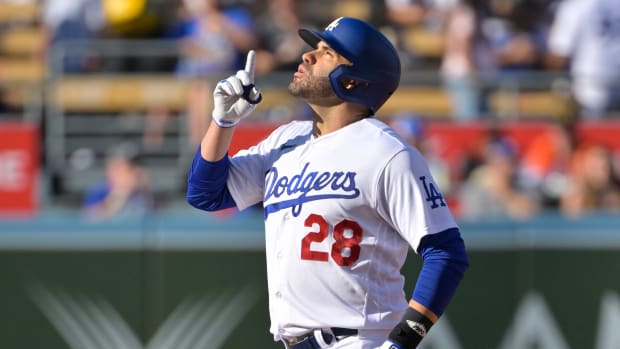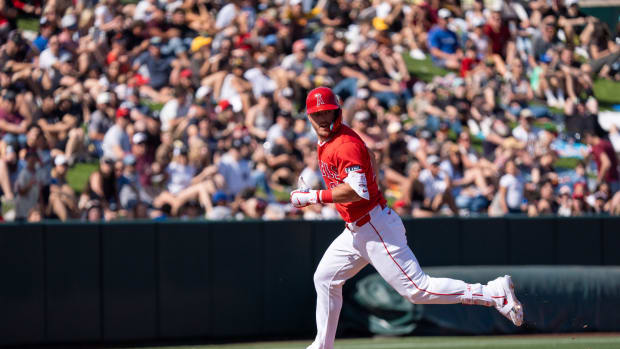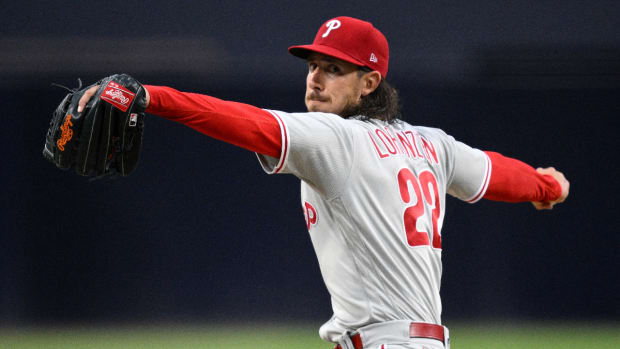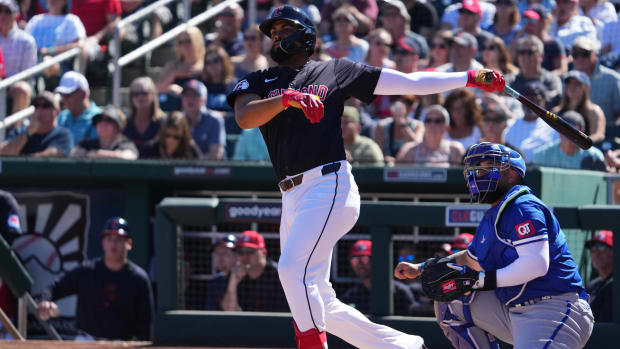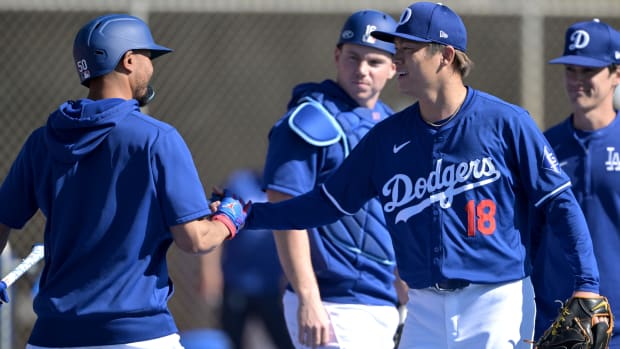All-Star Game debate: On starting pitchers, A-Rod, Pete Rose, more
The 86th All-Star Game takes place Tuesday night in Cincinnati, but before we head into the festivities for this year's Midsummer Classic, SI baseball writers Cliff Corcoran and Jay Jaffe got together to debate who the starting pitchers should be, whether MLB's fan voting process for the game needs a reform, whether Pete Rose and Alex Rodriguez should be on hand at Great American Ball Park and much more.
• MORE MLB: Picking this year's Anti-All-Star team
Who should get the ball for the National League?
Zack Greinke’s latest dominant outing vs. Phillies caps historic first half
Cliff Corcoran: This is the biggest decision that remains for this year's game. Max Scherzer seemingly had the NL start sewn up, but Zack Greinke has made a late push for the honor with 35 2/3 scoreless innings over his last five starts. That includes a dominant eight innings against the Phillies on Thursday night that dropped his ERA to 1.39, the lowest first-half mark by a qualified pitcher since 1968, The Year of the Pitcher. Both men have thrown exactly 123 1/3 innings, but Scherzer has accumulated that total in one fewer start and has 37 more strikeouts and six fewer walks as well as a lower WHIP, not to mention the best back-to-back starts in the last 100 years—one of them a no-hitter marred only by a controversial hit-by-pitch on the 27th batter.
Both pitchers are deserving of the honor, but I still favor Scherzer. Despite the disparity in their ERAs (Scherzer is fourth in the league at 2.12 after a poor outing on Tuesday), he still leads Greinke in Baseball Prospectus’s new Deserved Run Average, 1.82 to 1.94.
Jay Jaffe: Greinke's fantastic run and Scherzer's recent dud has put the former into the NL lead in the Baseball-Reference.com version of WAR (4.9 to 4.3) as well as ERA. Scherzer, though, has a league-low 2.04 FIP, whereas Greinke is at 2.77, which is eighth in the NL. What may decide this debate is the Nats' rotation plans. Scherzer is in line to start on Sunday, and by the rules in place, that would make him not only ineligible to start but also to pitch at all. While Washington manager Matt Williams hasn't announced his rotation for Saturday and Sunday yet, there's little justification to skip Scherzer given that the team has to get to the postseason before the payoff of an All-Star victory can even benefit the Nationals.
If you cross Scherzer off the list, there's nobody close to Greinke in bWAR (A.J. Burnett and Cole Hamels have 3.5 each). I can see NL manager Bruce Bochy taking the easy way out and choosing Gerrit Cole on the basis of his NL lead in wins (12 to Greinke's seven) and strong ERA (2.28, sixth in the NL), The bottom line, though, is that Greinke is worthy of starting, and if Scherzer isn't available, it would certainly simplify the process.
CC: There's an interesting twist in the Scherzer consideration, though. He will be on normal rest on Sunday, but after a rain-out on Wednesday and a day off on Thursday, every other Nationals pitcher is even more rested, which may tempt Williams to start someone other than Scherzer on Sunday (most likely Doug Fister). If Scherzer does start on Sunday, however, the only correct answer in the NL is to start Greinke.
Who should start for the American League?
JJ:Dallas Keuchel leads in bWAR and ERA (4.6 and 2.14, respectively), with Sonny Gray second in both (3.9 and 2.20). On the other hand, Chris Sale has a tremendous FIP (2.41) and just completed his record-tying run of eight straight games with 10 or more strikeouts. That recent dominance is enough for me to lean toward him.
CC: It’s definitely between Keuchel and Sale, and there isn't a wrong answer. Keuchel has undeniably been better this season, throwing 18 more innings than Sale and leading the league in ERA (2.14 to 2.80), ERA+ (181 to 134), bWAR (4.6 to 3.3) and Deserved Run Average (2.24 to 2.39). But Sale, who missed his first start due to injury, has been the better pitcher since early May (1.80 ERA in 85 innings over his last 11 starts to Keuchel’s 2.63 ERA in 78 2/3 innings, also in 11 starts) and was the best pitcher in the league on a per-game basis last year as well. Forced to choose, I’d go with Sale, but it’s a tougher decision than the NL pick.
• PODCAST: Tom Verducci on his favorite All-Star Game memories
Should All-Star picks be decided by performance this season alone or also recent years?
JJ: I firmly believe that whether it's fans, players or managers making the picks, the first half of this year's season shouldn't be the sole factor. If you're trying to figure out who the best players are, then second-half performances and larger sample sizes should count for something. That's why it's utterly ridiculous, for instance, that neither of the reigning Cy Young winners—Clayton Kershaw and Corey Kluber—are guaranteed to be there; Kershaw was a Final Vote candidate but lost to Carlos Martinez, and Kluber didn't even get that far. Despite a 6–6 record, Kershaw has a major league-best 160 strikeouts to go with a 2.39 FIP. Kluber, whose All-Star hopes were apparently doomed by a 4–9 record, has a 2.41 FIP and leads the AL with 148 strikeouts.
In the case of somebody like Robinson Cano, who's been just dreadful this season, I can see passing on him despite his strong track record. But in general, looking back at least as far as last season produces a much stronger team and a more defensible one. It takes more than three hot months to make a star, which is why it looks so weird when Brock Holt makes the team the AL team while Troy Tulowitzki isn't on the NL squad. Aren't the players at the All-Star Game all supposed to be … well, stars?
AL, NL All-Star Game rosters feature likely suspects, few surprises
With that said, looking at bWAR since the start of the 2014 season, the only pitchers outside the top 15 who aren't going to Cincinnati are Kluber (tied for sixth overall at 9.7), Johnny Cueto (9.3 bWAR and, like Kershaw, a Final Vote candidate), Jake Arrieta (10th at 7.6, held back by a 152 2/3-inning total last year), Jordan Zimmermann (13th at 7.0 and having a good year with a 3.05 ERA and 3.01 FIP but just 6.5 strikeouts per nine) and the injured Adam Wainwright (14th at 6.8). I can live with Arrieta, Zimmermann and Wainwright not going, but Cueto and Kluber count as snubs.
On the position player side, the highest-ranked in 2014–15 bWAR who aren't on the teams are Jason Heyward (8.7, 12th), Adrian Beltre (8.6, tied for 13th), Michael Brantley (also 8.6), Brian Dozier (8.3, 16th), Ian Kinsler (7.9, tied for 20th) and Kyle Seager (also 7.9). Dozier was a Final Vote candidate but lost to Mike Moustakas, and the others really didn't have a case: Heyward buried himself early, Beltre's been hurt and lousy, Brantley is a bit off last year's near-MVP form and Kinsler and Seager are likewise trending downward relative to last year.
Picking the 25-and-under All-Stars as wave of young talent makes impact
CC:
I don’t think stars should go on name alone, though, and Tulowitzki is a good example of one who was rightly left off the roster. He started the All-Star Game last year due to his incredible first half, then spent almost the entire second half on the disabled list. This year, Brandon Crawford and Jhonny Peralta (who were worth 3.3 and 5.7 bWAR, respectively, last year) have clearly been better shortstops in the NL, and I see no good reason why Tulowitzki should be favored over either of them.
[pagebreak]
Should Alex Rodriguez have made the AL team?
JJ: With regards to Rodriguez, any notion of using a sample size larger than this season means including his suspension last year and the injury-shortened 2011–13, in which he played just 265 games and posted a combined 6.4 WAR—hardly All-Star caliber. He's had a surprisingly strong first half (.276/.382/.498, 142 OPS+ with 16 homers) to help keep the Yankees afloat, giving him a nice comeback narrative to go with his sanitized public persona, but in light of the stronger seasons by fellow designated hitters Nelson Cruz and Prince Fielder, I don't think he was a must-have.
On the other hand, if this is a game for true stars, then Rodriguez is one of them—certainly more so than Holt, who seems to have been his competition for the final spot in the mind of AL manager Ned Yost. Nobody buys tickets to see Brock Holt, but they do buy them to see A-Rod, even if it's to boo him. I'd lean toward taking him.
CC: As you say, the fans were right that Rodriguez hasn’t been the best DH in the league to this point in the season (I think it's been Fielder, not the fans' choice in Cruz, but both are on the roster, so I won’t complain too loudly), while the players don’t vote for a backup DH, only reserves at the eight fielding positions (plus pitchers). I certainly don’t think Rodriguez needed to be on this roster, but I do think Yost should have put him on the Final Vote ballot, just to let the fans make the call there. That said, even if he had been, I don’t think he would have been the most deserving candidate among the five, and any support he would have received would have had more to do with who he was and the fascinating narrative of his last seven years than with the numbers he has put up this season.
Is it time to tweak the fan voting process?
CC: This is the biggest cause for snubs. If the AL didn’t have to make room for undeserving starters such as Alcides Escobar at shortstop and Jose Altuve at second base, there’d be room for guys like Dozier and Xander Bogaerts on this team.
The real issue, however, is not ballot stuffing—despite Royals fans' best efforts, they were only able to get four starters to the game this year, two of whom were arguably deserving (outfielders Lorenzo Cain and the now-injured Alex Gordon). The issue is that the voting starts at the end of April, and casting ballots based on three weeks of games is a complete joke.
Building best possible 25-man All-Star roster for National League
I see no reason that MLB can’t enact the brilliant idea put forth by MLB Network host Greg Amsinger and SI's Tom Verducci of having an Election Night in early July. As it is, the final man for each roster is elected in just five days in early July. Making the All-Star vote a one-day event is both logical and would seem to have tremendous publicity potential for MLB, and it would be instantly bigger than the first day of the draft, as well as any of the awards or the Hall of Fame announcements, because fans would be an active part of making the news. I would, however, make it one vote per fan, and no matter what MLB does, it’s clear the league needs to improve its authentication process (or, rather, have one at all).
JJ: At this point, I have very little confidence in the fan voting process. Mind you, I don't begrudge fans their enthusiasm for the hometown nine, whether we're talking about the Royals or any other team. But with the report of 65 million-plus ballots thrown out and the lack of any kind of verification system of email addresses—which has led to fans making up email addresses or, in some cases, using those of media members—it's a system that's obviously rife with abuse. It's silly to allow fans to vote 35 times, but ultimately I don't care. What I do care about is that if the fans are going to vote 35 times, they should have to verify each one of those votes through an email authorization process and subject themselves to the endless spam that will hit their accounts, since it is truly impossible to unsubscribe from any MLB.com junk mail list.
Even then, I'm not in favor of the fan vote being the sole determinant of the starting lineup. Maybe weight it 50%, with players and managers each getting 25%. Or this: 25% for each of those constituencies plus 25% for a statistically oriented panel. It doesn't have to be BBWAA; it could be the numbers guys within MLB Advanced Media or something, which ties into a chance to show off their new StatCast-driven information.
I like the idea of an Election Night, but I wonder if it needs to be expanded over a weekend or week to avoid the possibility of a server overload throwing a wrench into the process and thus giving the game a black eye from a PR standpoint. I suspect that it's a non-starter from MLB's standpoint anyway, given that the long lead time of the vote-when-you-want system constitutes the main advertisement for the game. Anyway, there are solutions out there to fix things, but it remains to be seen whether the league and commissioner Rob Manfred have the will to do so.
What about two other All-Star hot-button issues: roster size and home-field advantage in the World Series?
JJ: It would make sense to pare the rosters down to 30 per side, because the honor is getting diluted. I'm ready to junk the home field advantage tie-in, too. Make that some combination of won-loss record and run differential (you could weight actual and Pythagorean record 50–50, for example) and leave the All-Star Game for the purpose(s) it was originally designed.
CC: The home-field advantage thing doesn’t bother me because it’s just another randomizer. Alternating home-field advantage in the World Series between leagues, as was the previous system, was no less or more random than letting the All-Star results determine it. Despite interleague play. I don’t believe you can compare regular-season AL and NL results in a way that gets much closer to determining which team was better, unless you have a huge discrepancy between the regular-season performances of the two pennant winners.
What do you think of Pete Rose's presence in Cincinnati?
JJ: He's Cincinnati's favorite son despite his lifetime ban, so it would be somewhat weird not to have him there. Even so, the recent reports of evidence that connects his gambling to his time as a player leave me far less willing to cut him any slack even for a one-time exemption, let alone any kind of reinstatement into the good graces of MLB, which, as I wrote in the spring, seemed unlikely. He broke The One Rule, and instead of showing contrition or reforming his life, he piled this last lie on top of all the others and held onto it for another 11 years after his initial admission in his 2004 book My Prison Without Bars. So I think he's got no business being a part of anything with MLB's stamp on it.
CC: I can't argue with any of that. I don't believe in erasing or ignoring history, but he should not be a part of the on-field celebration. In fact, his absence from that ceremony should be conspicuous. That's the entire point of his ban: Rose was one of baseball's greatest players, but he committed sports' cardinal sin, and thus, he is not allowed on the field. Given what we know now about not only his transgressions but also his decades-long cover-up even after supposedly coming clean, there's no reason to extend any mercy to him, not even for a brief on-field ceremony in his hometown.
































